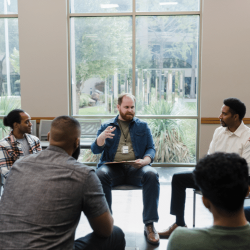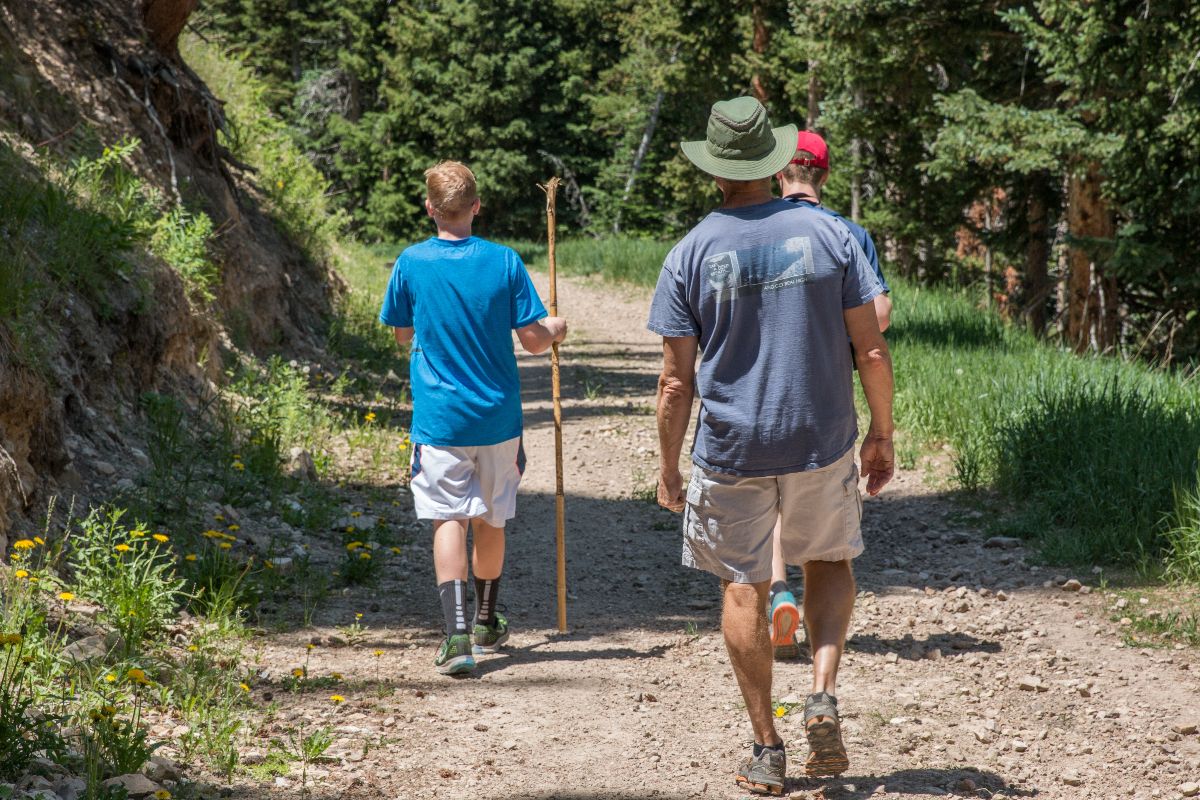Addressing the Fear of the Unknown
Starting residential rehab can feel intimidating—especially for men who’ve spent years hiding pain behind silence. Whether you’re considering treatment for yourself or researching for a loved one, one thing is clear: uncertainty creates resistance. At Healing Pines Recovery in Colorado, we help men move from uncertainty to clarity, isolation to
Read More
Changing Lives Through Addiction Treatment in Colorado
Healing Pines Recovery is here to help. Our drug rehab center in Colorado offers men the chance to recover, surrounded by natural beauty and a supportive community.
Comprehensive Drug Rehab in Colorado
Our Colorado rehab centers, located within driving distance from both Elbert County and Douglas County, use evidence-based, experiential, and holistic approaches to recovery. We understand that learning new ways to navigate the world is critical to long-term sobriety and treatment success. For many of our clients, that includes learning how to accept, process, and communicate emotions.
Humans are incredibly complex individuals, shaped by their unique experiences and life decisions. That’s why we believe that there’s no single treatment program or solution that works for every person recovering from drug addiction.
Our addiction treatment center in Colorado is designed to help men conquer emotional hurdles in support of their drug addiction recovery. We genuinely care about and strive for the success of every person that enters our program. At Healing Pines Recovery, we provide many tools to help with recovery and then apply the most effective solutions for each individual.

How We Can Help
Healing Pines Recovery is a boutique-style inpatient rehab center in Colorado with a true focus on individualized programming and care for men. Masters level clinicians apply evidence-based, holistic, and experiential modalities for a truly authentic and individualized experience.
Healing Pines founder Paul Leafstedt wanted to bring his passion for recovery, the great Colorado outdoors, and quality care to the Denver and Colorado Springs area. Healing Pines provides state-of-the-art residential addiction treatment in a safe, beautiful, and private setting.
We serve all of Colorado including Elizabeth, Colorado Springs, and Denver. We are close enough to the city for the family to participate, yet far enough removed to provide complete peace and solitude.
Substance Abuse
Learn more about our substance abuse treatment program for men in Colorado and how we can help you find long-term healing from addiction.
Residential Inpatient
We offer supportive inpatient rehab and residential treatment at our beautiful home in the scenic small town of Elizabeth, Colorado.
Mental Health
For individuals struggling with substance abuse and mental health (dual diagnosis) we offer comprehensive therapeutic modalities.
Wellness & Treatment Modalities
Healing Pines Recovery offers a client-first approach to addiction treatment at our Colorado residential treatment center. From the moment a client enters the doors they are immersed in a personalized experience. Our rehab program for men is rooted in community support and expansive treatment approaches that help our clients build a foundation for long-term success in recovery.
Request a Confidential Callback
An Unforgettable Experience
Healing Pines Recovery addiction treatment facility offers a relaxed setting surrounded by mature pines with views of the mountains. We’re located in Elizabeth, Colorado, a charming small town about an hour’s drive from both Denver and Colorado Springs.
Our Colorado drug rehab center allows clients to receive comprehensive and compassionate treatment for their addiction and mental health disorder in a small group setting.
Our beautiful log home and its natural surroundings provide a peaceful healing environment. Here we combine traditional and alternative treatments, with structure and practices to support our clients as they embrace a happy, fulfilling life.
Don't Let Anything Stop You From Getting Help.
At Healing Pines Recovery, we meet you wherever you are on the road to recovery and help you develop the skills needed to live a sober life. We’re among the top-rated addiction treatment centers in Colorado for men. You can count on us to lend a helping hand if you’re looking for rehab in the greater Denver or Colorado Springs area.
We work with most major commercial insurance plans which can help cover up to 100% of the costs associated with treatment.

News & More
Check out the latest news and informational articles from the Healing Pines Recovery blog.
Breaking the Cycle of Isolation and Shame
Many men enter addiction treatment burdened with shame, pressure to “tough it out,” and resistance to vulnerability. In co-ed settings, these internal barriers often go unchallenged. Men may struggle to open up, fearing judgment or appearing weak. At Healing Pines Recovery, our men-only approach removes these barriers. It fosters
Read More
Rebuilding a Connection With Self and Nature
For many men struggling with addiction, the world can feel overwhelming—loud, fast-paced, and full of pressure to perform. In recovery, peace and presence are essential. Nature offers both. At Healing Pines Recovery, we believe that the outdoors isn’t just a backdrop for healing—it’s a co-therapist. Our nature-based recovery program
Read More
The leadership and staff were committed to my success.
Paul is a man of integrity which flows through his team. I have been to other recovery programs and HPR stands far above them all. The small group structure offers a more intimate and personalized experience. This was so much more beneficial to my recovery than facilities preaching a "one-size-fits-all" solution to larger and fragmented groups. It was like having personal and knowledgeable therapists dedicated to me for a full month! They went out of their way to understand the root of my challenges and construct a path for improvement that is unique and relatable to me. This was a huge benefit!
Jay C
Healing Pines Recovery probably saved my life.
Healing Pines Recovery probably saved my life. My alcoholism had been spiraling out of control by the time I arrived. I didn’t know what to expect in rehab other than I would go thirty days without drinking. Healing Pines provided me so much more than a brief spell of sobriety. The holistic approach to recovery equipped me with the tools I needed to start a lifetime free of alcohol. I benefited from so many aspects of treatment: behavioral therapy, individual counseling, medical diagnosis, recreation, informal interactions with the staff and fellow residents, and even the serene Colorado setting. Healing Pines was truly therapeutic from both addiction-recovery and overall mental health perspectives. I left there not only on a trajectory to permanent sobriety but also a better person. Paul, the therapists, and everyone else at Healing Pines are amazing. What impresses me most is how they genuinely care so much about my success in recovery. That level of personal care has continued months after I completed inpatient treatment. HPR supports me in my recovery journey to this day through its outpatient program and the lasting friendships I developed there with staff and residents alike. I enthusiastically recommend Healing Pines to those who are serious about overcoming addiction and who desire a personal and comprehensive approach to their treatment.
Sean S.
I would HIGHLY recommend HPR to any one
I spent 30 days at HPR and I would HIGHLY recommend it to any one who is waiting to start the process of beating additional. The counselors are amazing! You really learn what you need to have the tools to succeed. It is a very comfortable atmosphere with a beautiful scenery. Daily activities are very beneficial to understanding a lot about yourself as well as learning what is needed in continuing your goal of sobriety. HPR gives you the personal attention that leads to education and success. By far the best place in Colorado in my humble opinion.
Sandy C.
Best decision I’ve ever made was going here.
Best decision I’ve ever made was going here. The staff is incredible and the ranch is beautiful. Couldn’t have asked for a better place to work on and learn about myself. This isn't just a place to dry out, you get out of it what you put into it. Everyone here is serious about their recovery and supports each other, it’s a brotherhood. Can’t thank Paul and the staff enough, HPR is truly special.
Ryan B.
It saved my life, in every sense.
I spent a month at Healing Pines Recovery. The actual location itself is unreal. A beautiful cabin lodge, with gorgeous scenery. The rooms are large, queen beds, very comfortable! Great bathrooms with great showers! There is a pool table, slam jam, (Christine! 😉 frisbee golf, and daily access to a nearby gym. The property also has a pickle ball court that was used daily, Zoey the counselor beat us men constantly!
Clay M
Healing Pines Recovery helped me find healthy ways to deal with underlying factors contributing to my addictions.
Healing Pines Recovery helped me find healthy ways to deal with underlying factors contributing to my addictions. The holistic treatment process they guided me through showed me how to improve myself mentally, physically, and emotionally. The staff is caring, hands on, with you every step of the way, and gives you a program that is specific to your recovery. I am very fortunate to be involved with such a lovely community and provided me with contacts and advice for my continued care after completing the program. Having a smaller group of residents (~6 people) allowed a personal experience and relationships to blossom during my stay. I would highly recommend HPR to anyone wanting to overcome their addiction and create a plan for long term sobriety.
Sean F.
My experience with Healing Pines Recovery has been wonderful.
My husband was their client, and they helped him be able to help himself. He is doing amazing! I think the combination of counseling, physical labor, meditation, AA, and just the beauty of the place itself all had a very positive impact on him. They really cared about him, and that did not stop just because he came home. Also they have counseling for the families and it has really helped me a lot. Heather is awesome! I thank God that we had them in our lives when we were most vulnerable.
Susan M
We wanted to share our gratitude to the staff.
Our son was under the care of Healing Pines recently and we wanted to share our gratitude to the staff. There were many challenges in his pursuing treatment, and thankfully Paul and Heather C helped us navigate all of them skillfully with patience and compassion.
Jim E
A wonderful place to recover
Healing Pines saved my life and I would recommend anyone with drug/alcohol addictions to go there for treatment. It’s a wonderful place to recover and the therapists on staff are great at bringing perspective, conflict management, self acceptance/self awareness, and getting to the root of the problem. The insight they bring in group therapy was very therapeutic and important to my growth towards my path to sobriety. Paul is a perfect role model for men with substance abuse. They will show you the way to a healthy life and get you back on track.
Garhett D.
You'll get your life back!
Healing Pines Recovery is/was instrumental in setting me up for long term success in my recovery journey. I've been to treatment centers in the past and HPR is nothing like anything I've attended before. They're very small, intimate, and hands-on approach to recovery was exactly what I was looking for when seeking treatment. I knew that a large, one size fits all program like those offered by many other treatment centers in Colorado wouldn't provide me with the help I desperately needed. Paul and his Team are incredible and I would highly recommend HPR to anyone who needs help starting their recovery journey. Big shout out to James for all of his guidance during my time at HPR. His grace, knowledge, understanding, and direction were/are key to my continued success in recovery. One HUGE piece of the puzzle I love is the after care I've received from HPR... I am in constant contact with Paul, James, and many other staff members through the their alumni programs and it has helped me so much with life after HPR. This program was truly a miracle in my life and I know it will be for many other men struggling with addiction and/or alcoholism. You'll get your life back!
Nicholas P
This is truly a great recovery facility.
My learning experience here was something I’ll take with me throughout my whole life. The staff here will always be a part of my family and I am beyond thankful for everything they have done and continue to do for my well-being.
Gunnar P
I can't speak more highly of Healing Pines Recovery & Addiction Center.
It is located in a beautiful Colorado location with lots of outdoor activities and fresh air. They have a very knowledgeable and professional staff that goes above and beyond to meet your needs.
Riley K
By far the best place to get the tools you need to begin your recovery
From the absolutely beautiful area Healing Pines Recovery is surrounded by, to the staff that shows you that they sincerely care about each of the patients that come through the doors, it is by far the best place to get the tools you need to begin your recovery. There are so many things do to on the ranch and they incorporate therapy into every activity that we did, making it fun and educational in regard to recovery. You get the individual attention that you need a long with group sessions that are small enough to be comfortable, as well as getting the connection needed for recovery. The beds are comfortable, the food is amazing, and the all-around vibe of the place is peaceful and relaxing. Thank you so much Healing pines, Paul and all of the staff for changing my life! I will be forever grateful for what you have given me!!
Adam O.
I couldn’t have been at a more amazing place to begin this journey.
Seriously an amazing place. Everything from how beautiful the house and the property it sits on down to every person staffed there was nothing less than perfect. More than highly recommended in every sense. If you’re reading this and trying to find the right place for treatment and recovery I would absolutely look no further. Everyone’s recovery is different and we all need a comfortable place with people we can trust through this battle, healing pines understood that everyone’s path is different and they 100% cater to that. I couldn’t have been any luckier with finding Healing Pines. I won’t go any deeper and start to thank everyone there individually, But I want to express my gratitude to everyone on the HEALING PINES TEAM. Without you all, my path in sobriety would not look anywhere near the way it looks today. Seriously from the bottom of my heart thank you!
James M
HPR gave me the tools to re-enter the world with confidence in my newfound sobriety.
HPR gave me the tools to re-enter the world with confidence in my newfound sobriety. Before making my decision to attend this facility Paul spent multiple hours on the phone with me and my family answering our questions and concerns, and taking time to really get to know me and understand where I was with my addiction. Our phone calls put me at ease. Despite the fact that I had to travel halfway across the country to attend HPR, I went in with an extreme sense of calm and security knowing that Paul and the rest of the HPR staff were there to help me. The program is built to focus on the individual, rather than feeling lost in a crowd of 20-30 people, the house only keeps 6 guys at a time, which made me feel focused on. The smaller group quickly results in the closeness of those at the house. During my stay at HPR, I got incredibly close with my housemates; watching movies, playing disc golf, going on hikes, playing pickle ball, shooting pool, making music together or just sitting out talking by the fire at night, and when I needed alone time, the house is more than big enough for me to step away from the group and have some solitude. The location is breathtaking, the staff are incredible, and I could easily continue this review with countless positive things to say, but I have run out of characters so I will end with this: If you have made it this far in this review and are still on the fence, don't be, you will not find a better place than HPR!
Sean S.
Healing Pines is a truly wonderful place.
Healing Pines is a truly wonderful place. The amount of compassion that all of the staff exhibit on a daily basis is amazing. The facilities truly are beautiful and the program is wonderful. I will forever be grateful for Healing Pines and the entire staff.
William S.
Healing Pines Recovery (HPR) has truly been a life changing experience for me.
Healing Pines Recovery (HPR) has truly been a life changing experience for me. After years of suffering pain and loss through my addiction, HPR has inspired me to positive action and change to my inner self. The ranch is very clean and is nestled on 40 wooded acres offering a scenic view of the Rockies. The queen beds are comfortable and the meals are delicious (Thank you Cathy!) It is a serene environment and a perfect escape that allowed me to shut out the "noise" and focus on my recovery. The leadership and staff were committed to my success. Paul is a man of integrity which flows through his team. I have been to other recovery programs and HPR stands far above them all. The small group structure offers a more intimate and personalized experience. This was so much more beneficial to my recovery than facilities preaching a "one-size-fits-all" solution to larger and fragmented groups. It was like having personal and knowledgeable therapists dedicated to me for a full month! They went out of their way to understand the root of my challenges and construct a path for improvement that is unique and relatable to me. This was a huge benefit! Thanks for helping me to heal and change my life!
Jay C.
Schedule a Tour Today
Come discover why Healing Pines Recovery is you top choice for addiction treatment in Colorado and beyond.
Begin Your Journey & Escape Addiction
The first step can be the hardest. Fill out the form or call us at (720) 575-2621. You will be connected with a Healing Pines Recovery specialist who can answer your questions and help you get started.
Let Us Help You
Speak to Someone Right Now


































